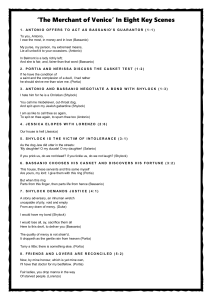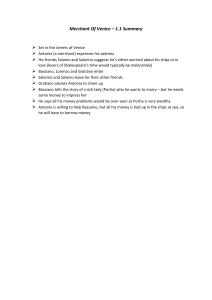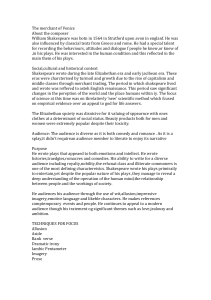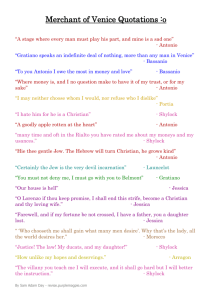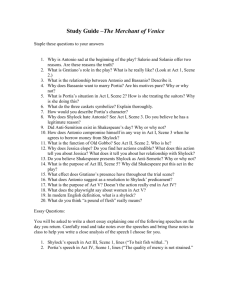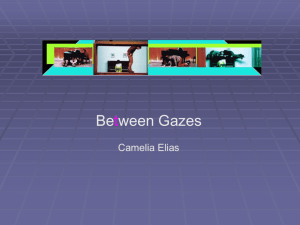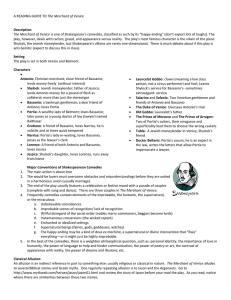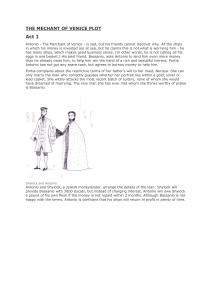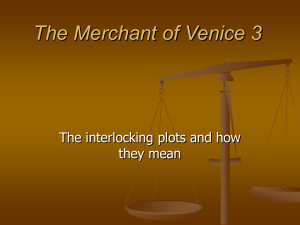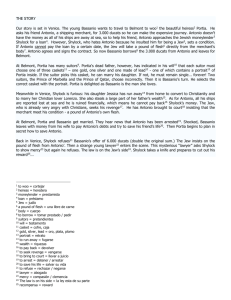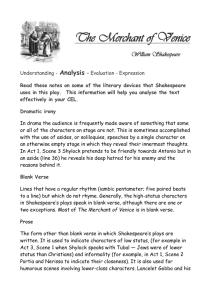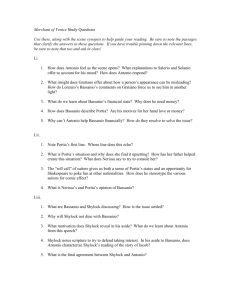merchant-of-venice-Act-III
advertisement
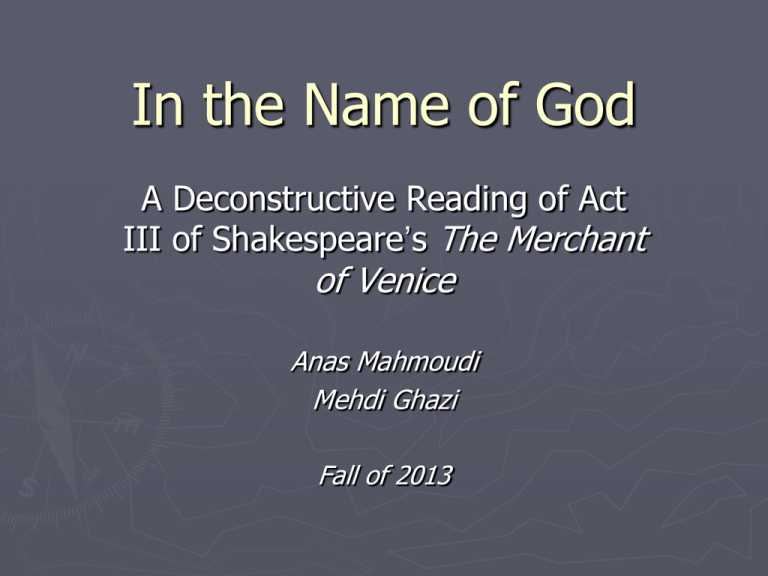
In the Name of God A Deconstructive Reading of Act III of Shakespeare’s The Merchant of Venice Anas Mahmoudi Mehdi Ghazi Fall of 2013 A Summary of Act III Scene I: Salanio and Salarino are concerned by the news that Antonio has lost a ship. They question Shylock’s revenge-based attitude toward Antonio. Scene II: Bassanio chooses the correct box and wins the hand of Portia. Salarino brings a letter, bearing the news that Antonio is bankrupt and is on the verge of paying his bond. Scene III: Shylock is adamant to carry out the punishment on Antonio. Scene IV: Portia asks Lorenzo and Jessica to manage her property in the absence of Bassanio and herself. Portia and Nerissa decide to disguise as men and appear as lawyers in Antonio’s case. Scene V: Lancelot teases Jessica by saying that she cannot find salvation due to the fact that she is Shylock’s daughter. Lorenzo and Jessica joke with one another. Binary Opposition It seems that the sense of the inevitability of making extreme contrasts has been a ghost that has haunted man from the days of Plato. From such a point of view, Derrida believes, one cannot make the proper judgment. He becomes a mere puppet in the hands of the inherited dualities, which spur him not to pair things up as supplementary forces. Derrida is of the opinion that the more we credit this superior/inferior system of thought, the more we unnecessarily narrow down our interpretations. In Scene I, Act III we come across this binary judgment. Salarino draws a line between Shylock and Jessica, pointing out how Jessica is far superior to her father: “There is more difference between thy flesh and hers than between jet and ivory, more between your bloods than there is between red wine and rhenish” (1995: p. 35). Salarino is so logocentric in his appreciation of things that he makes an idol out of Jessica, while he lashes out at Shylock. Aporia Derrida believes aporia is “an undecidable question” (1993: p. 7). It refers to one’s seemingly irrefutable conviction that no further excuses are accepted for postponing an impasse. In such a situation, he arrives at the conclusion that he cannot delay in carrying out his design, which in the long run turns out to be against commonsense. Shylock’s resolution in getting even with Antonio leads to such an extreme that the only imaginable choice for him is revenge: SALARINO: Why, I am sure, if he forfeit, thou wilt not take his flesh: What’s that good for? SHYLOCK:To bait fish withal. If it will feed nothing else, it will feed my revenge. He hath disgraced me and hindered me half a million, laughed at my losses, mocked at my gains, scorned my nation, thwarted my bargains, cooled my friends, heated mine enemies—and what’s his reason? I am a Jew…If a Jew wrong a Christian, what is his humility? Revenge. If a Christian wrong a Jew, what should his sufferance be by Christian example? Why, revenge. The villainy you teach me I will execute—and it shall go hard but I will better the instruction (1995: p. 35). Having to deal with such an unconquerable avalanche, Shylock is stuck in an aporetic situation. He does not differ his decision for a possible reconciliation with other alternatives. Differance Not to be dominated by single vision of reality, the individual provides himself with the opportunity to ascertain what move to take in the future. In this way, present with its limited point of view does not constrain one from holding off one’s judgments. To differ one’s judgments, Derrida holds, will only serve to assist one in making the proper decision in the proper moment. Bassanio is not certain whether he has won the hand of Portia or not; thus, he intends to make sure what the reality is by postponing his judgment: Fair lady, by your leave, I come by note to give and to receive. Like one of two contending in a prize That thinks he hath done well in people’s eyes, Hearing applause and universal shout, Giddy in spirit, still gazing in a doubt Whether these pearls of praise be his or no— So, thrice fair lady, stand I even so, As doubtful whether what I see be true Until confirmed, signed, ratified by you (1995: p. 40). The above citation shows that Bassanio does not want to make a hasty decision, and, by delaying his perception of reality, he does not allow his aspiration to deter him from confiding with his commonsense. Messianicity By resolving to make a leap forward, an individual allows his optimism to come to the fore. At a time when things do not seem to work out, a thought, a wish equips one with a weapon to stand against the present with the hope that future would inevitably send forth the long-sought happiness. In Scene II Portia shows a strong sense of optimism; she anticipates that by marrying Bassanio, she will have the opportunity to get educated by him: The full sum of me Is sum of something which, to term in gross, Is an unlessoned girl, unschooled, unpracticèd; Happy in this—she is not yet so old But she may learn. Happier than this— She is not bred so dull but she can learn (1995: p. 40). Attachment It seems inevitable to feel a devotion to a particular person, thing in life’s dealings. Such devotion is sometimes so strong that one does not think of alternatives, blocking the path of progress. Sometimes this affection is helpful in the sense that it ushers one in life by giving him the cause of stability in his attachment to that specific thing. To claim that Bassanio’s attachment to Portia’s ring is the helpful guide may not be amiss. In creating the atmosphere of sincerity, both Bassanio and Portia bestow meaning upon one another’s life. The following quotation reveals how steadfast Bassanio is in his attachment to the ring Portia has given to him: But when this ring Parts from this finger, then parts life from hence. O, then be bold to say Bassanio’s dead (1995: p. 41)! The End►
